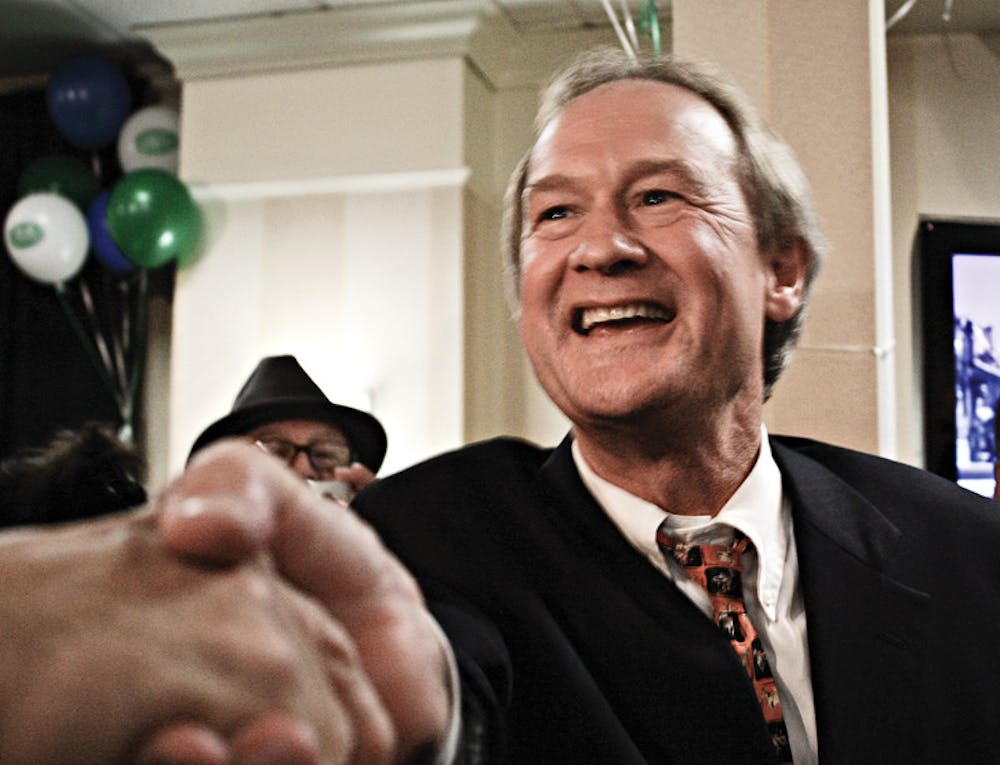Gov. Lincoln Chafee ’75 P’14 P’17 announced Sept. 4 he will not seek re-election in the 2014 gubernatorial race, presumably marking the end of his 27-year career in Rhode Island politics. Having served on the Warwick City Council, as mayor of Warwick and in the U.S. Senate, Chafee told reporters during a press conference he wants to avoid the confines of electoral politics and focus on the issues residents are most concerned about during his remaining time in office.
Chafee dedicated his term to “doing what is necessary for Rhode Island to be stable through good economic times and bad economic times,” said Christine Hunsinger, Chafee’s press secretary. Chafee’s decision to not run for reelection will allow him to dedicate the remainder of his term to “cementing those programs and processes,” she said.
Maureen Moakley, professor of political science at University of Rhode Island, said she thinks his explanation is believable.
“Campaigning would have been a huge distraction in terms of governing, and he would have had to make some compromises,” Moakley said. “Whatever you want to say about Chafee, he is a very principled, somewhat quirky, but very principled individual.”
Chafee’s term as governor was particularly difficult due to Rhode Island’s financial struggles, Hunsinger said. “The size of the hole that this administration had to dig out of was significantly larger than anyone could have known,” she added.
Chafee struggled with the state constitution’s “mismatch of power” between the legislature and the governor’s office, Hunsinger said. Since the legislature often has the authority to overpower the weaker governor’s office, Chafee had trouble pushing his own agenda, she added.
Though governors generally tend to lose influence with the legislature at the end of their tenures due to their impending exit from politics, Chafee might be less affected by the phenomenon because the position of governor in Rhode Island already has very little power, Moakley said.
Chafee said in his announcement he will submit a piece of legislation for the 2014 state ballot asking Rhode Islanders to call a new constitutional convention to reevaluate the balance of power between the legislature and the governor. Rhode Island’s last constitutional convention was held in 1986, and Chafee’s first elected position was as a delegate to that convention.
The governor’s decision not to seek a second term was also partially strategic, said Marion Orr, director of the University’s Taubman Center for Public Policy.
“My thought would be that his chances of winning re-election were so slim that he decided to bow out and not face losing re-election,” Orr said.
After Chafee joined the Democratic Party in May, analysts speculated he was positioning himself to run for reelection in a three-way Democratic primary against Providence Mayor Angel Taveras and General Treasurer Gina Raimondo.
“It is not odd that he would be a Democrat, but at the same time I think the decision was made in a very strategic context,” Orr said, as a more crowded primary race could allow Chafee to win without the majority of the vote.
Chafee began his career as a member of the Republican Party but announced an Independent affiliation in 2007, after losing his Senate seat to Sen. Sheldon Whitehouse, D-R.I. During his tenure as a Republican senator, Chafee was vocal about his disapproval of Republican President George W. Bush and many of the policies and actions taken during Bush’s tenure. In both the 2008 and 2012 presidential elections, Chafee was a strong supporter of President Obama.
When Chafee lost his seat in Congress, his approval rating stood over 60 percent, according to exit polls conducted by CNN in 2006. In the most recent poll on Rhode Island politics published by the Taubman Center in February, Chafee’s approval rating came in at 25.5 percent, significantly lower than those of potential opponents Taveras and Raimondo, who had approval ratings of 63.7 percent and 56 percent, respectively.
Chafee’s low approval ratings were due in part to the timing of the economic downturn and high level of unemployment in the state, Orr said.
“He also pushed ideas that never really caught on with the public,” like his proposal to raise taxes on meals and beverages, Orr said. He received negative press after calling the decorated spruce in the State House in December a “holiday tree” instead of a Christmas tree, though he was continuing the policy of former Gov. Donald Carcieri.
“I suspect we’ve probably seen the last of Chafee in terms of an elected official” in the state, Orr said, but added that there has been speculation about Chafee receiving an appointment to a federal position due to his strong relationship with President Obama. Chafee was the only non-Democrat to speak at the Democratic National Convention in August 2012 when Obama was named the Democratic Party’s nominee for the presidency. “An ambassadorship may in fact be possible,” Orr said.
Some of Chafee’s central accomplishments have included developing infrastructure and changing the way transportation is funded in Rhode Island, Hunsinger said, along with his continued focus on fiscal responsibility and the environment.
“Those are lifetime accomplishments that are felt by the taxpayer directly,” Hunsinger said.

ADVERTISEMENT




